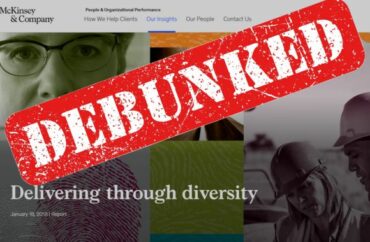
ANALYSIS: Questionable DEI research has proliferated across federal government
Questionable research claiming benefits to “diversity, equity, and inclusion,” in corporations has been cited by at least 51 federal government entities, according to a College Fix analysis.
A Department of Labor Employee Security Benefits Administration rule expanding the use of “environmental, social, and governance criteria,” for retirement fund managers is just one example of how a series of papers from McKinsey and Company have been used to justify DEI initiatives.
The Biden administration’s proposal cited two studies by McKinsey and Company that claim diverse leadership is associated with higher profits.
These and two other McKinsey papers are now under scrutiny.
“The DoL citing McKinsey studies to argue for regulation weakens the case for ESG,” economist Alex Edmans said in a comment to The Fix. “It suggests that the DoL has already decided that it wants to regulate and searches for any study that will support this idea, regardless of its quality.”
Business scholars Jeremiah Green and John Hand recently found flawed methodology in three of McKinsey’s studies and questioned the company’s body of research. Edman, a professor at London Business School, wrote in March that the fourth study has “the same basic errors.”
McKinsey has not addressed these findings despite inquiries from The Fix.
“McKinsey is a consultancy, not a research organisation, and the goal of its papers is marketing rather than scientific inquiry,” Edmans told The Fix. “That the DoL quotes McKinsey studies with very basic flaws, rather than scientific research, shows that it is engaging in advocacy rather than evidence-based policy.”
Such advocacy occurred throughout the government after McKinsey began publishing its work in 2015. The Fix found that at least 51 executive branch agencies and sub-agencies cited the studies to push diversity agendas. The Fix’s analysis relied on media coverage, available lists of agencies, and hundreds of filtered Google searches.
Officials across multiple presidencies sought to diversify their staff, using the research as justification.
Customs and Border Protection’s “diversity, equity, inclusion, and accessibility” plan, for example, calls for “policies … to address under-representation” of women and minorities through Fiscal Year 2026. “Numerous studies demonstrate that organizations with a diverse workforce … outperform their peers over time,” the document states – citing one McKinsey paper.
The government also pressured the private sector to conform, using McKinsey research to argue DEI would help specific industries succeed.
In one case, the Obama administration claimed that paying employees based on merit “can exacerbate inequalities” in STEM jobs. “Certain pay-for-performance systems or performance-based merit pay tend to increase disparities between majority and minority employees,” according to a 2016 report by an interagency group in the White House.
NASA and the Office of the Comptroller of the Currency, along with several federal laboratories, also cited the flawed research.
Advocacy groups defend merit-based system
Critics of DEI expressed concern about race-conscious policies in comments to The Fix.
“The real bottom line is that no ideology, movement, or social initiative inside the free market will ever outperform merit,” Mike Markham, program coordinator for Color Us United, said.
“Some believe that ethnic minorities can never get a fair shake in the marketplace,” Markham said. “As long as that belief – however unfounded it may be in any given situation – persists, the DEI flock will look to make excuses for favoring certain individuals.”
Markham said taxpayer-funded entities “should never be in the business of promoting false, divisive, and harmful ideologies.”
The McKinsey citations span across almost all cabinet-level departments, including four under President Joe Biden’s Defense Department.
One Army veteran criticized the “ideologically biased actors” promoting the research.
“On a fundamental level, people understand that you can hire on the basis of merit or you can hire on the basis of something else,” Stefan Padfield of the National Center for Public Policy Research told The Fix.
“While people also understand that diversity of viewpoints can be good for business, we all know that a rainbow coalition of leftists is simply an echo chamber,” Padfield said. “So, it comes as no shock when these studies that are cited for the proposition that forcing race and sex diversity on institutions will make them better turn out to be deeply flawed.”
“In fact, the better studies appear to demonstrate what most people would expect, which is that forcing diversity of race and sex on work groups undermines performance when compared to simply hiring the best people available,” Padfield told The Fix.
MORE: Truman Scholarships overwhelmingly awarded to progressive students for 10th year in a row
IMAGE: Bezruk/Shutterstock
Like The College Fix on Facebook / Follow us on Twitter






Please join the conversation about our stories on Facebook, Twitter, Instagram, Reddit, MeWe, Rumble, Gab, Minds and Gettr.